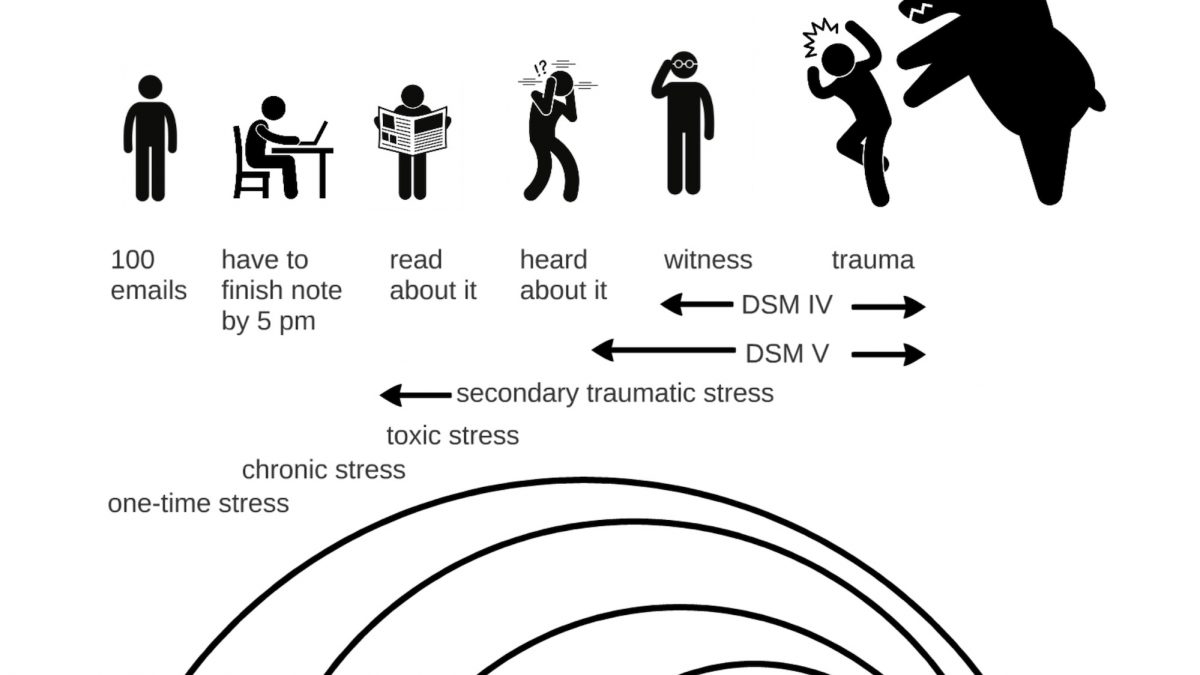Transforming Vicarious Trauma
{25 minutes}
Transforming Vicarious Trauma
Healing Secondary Traumatic Stress
This article is excerpted from Understanding and Addressing Vicarious Trauma by Dr. Laurie Anne Pearlman and Lisa McKay (2008). Licensing agreements pending. Please note that it was originally written for humanitarian workers. Over 10 years of research at Applied Mindfulness, we determined that it applied to human service workers in community mental health, medicine, government, and education, where we utilized the framework in hundreds of trainings. In the article below, we have used the term 'Human Service' workers, but please note that this is a broad category that could also include frontline staff in a variety of professions, as well as caregivers of all kinds.
For your reference, this article is divided into six sections:
What is Vicarious Trauma
Who May be most at-risk for Vicarious Trauma
Common Signs of Vicarious Trauma
Coping with Vicarious Trauma
Transforming Vicarious Trauma
Resources on this site for coping with and transforming vicarious trauma
Human Services workers often assist people who have been victimized. They work in and with communities that have been impacted by systemic oppressions and conflict, and this work can be extremely challenging. They themselves are sometimes the targets of violence. As a result of all these things, human services workers may experience lasting psychological and spiritual changes in the way that they see themselves and the world.
Some of these changes can be positive. Human Services workers often talk about how witnessing (and sometimes sharing in) the sufferings of people they are there to help has led to personal changes they appreciate – such as more compassion and gratitude, and a deeper understanding of what they value in their own lives and why.
However, some of the changes that can come from witnessing and experiencing suffering can be more problematic, leaving potentially permanent scars.
What is Vicarious Trauma?
Vicarious trauma (VT) is the process of change that happens because you care about other people who have been hurt, and feel committed or responsible to help them. Over time this process can lead to changes in your psychological, physical, and spiritual well-being. If you are a human services worker, it is important to understand the process of vicarious trauma, because it will almost certainly impact you in some way. But that’s not all. It will also impact your family, your organization, and the people you are working to help.
Vicarious trauma is a process that unfolds over time. It is not just your responses to one person, one story, or one situation. It is the cumulative effect of contact with survivors of systemic oppressions or people who are struggling.
Vicarious trauma happens because you care – because you empathize with people who are hurting. Empathy is the ability to identify with another person, to understand and feel another person’s pain and joy.
Vicarious trauma happens because you feel committed or responsible to help and at times, you are unable to fulfill that commitment. It can lead to very high (and sometimes unrealistic) expectations of yourself and others, and for the results you want to see from your work. Your sense of commitment and responsibility can eventually contribute to you feeling burdened, overwhelmed, and hopeless in the face of great need and suffering. It can also lead you to extend yourself beyond what is reasonable for your own well-being or the best long-term interests of beneficiaries.
A key component of vicarious trauma is changes in spirituality, which can deeply impact the way you see the world and your deepest sense of meaning and hope.
Who may be most at risk for Vicarious Trauma?
VT may be more problematic for people who tend to avoid problems or difficult feelings, blame others for their difficulties, or withdraw from others when things get hard.
Those who have experienced trauma themselves may identify more closely with particular types of pain or loss others have experienced, and may be more vulnerable to experiencing vicarious trauma.
Added stress in other areas of your life can make you more vulnerable to vicarious trauma.
A lack of connection with a source of meaning, purpose, and hope is a risk factor for developing more problematic vicarious trauma.
Lack of good social support—having people to talk to who care about you and your welfare—puts you at increased risk for vicarious trauma.
Unsustainable professional and work-life boundaries and unrealistic ideals and expectations about work can contribute to more problematic vicarious trauma.
Research suggests that human services workers who have more work-related exposure to trauma survivors are likely to experience more problematic vicarious trauma.
Human services organizations that don’t foster an organizational culture of effective management, open communication, and good staff care, increase their staffs’ risk of vicarious trauma.
Not understanding cross-cultural differences in expressing distress and extending and receiving assistance can contribute to an increased risk of vicarious trauma. (See Relating Across Difference)
Human services work as a profession is often characterized by self-neglect, toughing it out, equating self-worth with your ability to help others, and denial of personal needs. All of these can contribute to more severe vicarious trauma.
Common Signs of Vicarious Trauma
Some common difficulties associated with vicarious trauma include:
Difficulty managing your emotions;
Difficulty making good decisions;
Problems managing the boundaries between yourself and others (e.g., taking on too much responsibility, having difficulty leaving work at the end of the day, trying to step in and control other’s lives);
Problems in relationships;
Physical problems such as aches & pains, illnesses, accidents;
Difficulty feeling connected to what’s going on around and within you; and
Loss of meaning and hope.
Vicarious trauma can negatively affect your work, your colleagues, the overall functioning of the organization, and the quality of assistance being provided to those you are working to help.
Vicarious trauma influences the way you act and interact with people you love. This affects your family and friends.
Coping with Vicarious Trauma
Coping with vicarious trauma means identifying strategies that can both help prevent vicarious trauma from becoming severe, and help manage vicarious trauma during times when it is more problematic. Good coping strategies are things that help you take care of yourself – especially things that help you escape, rest, and play. Among other things, these might include:
Escape:
Getting away from it all, physically or mentally (books or films, taking a day or a week off, playing video games, talking to friends about things other than work);Rest:
Having no goal or time-line, or doing things you find relaxing (lying on the grass watching the clouds, sipping a cup of tea, taking a nap, getting a massage); andPlay:
Engaging in activities that make you laugh or lighten your spirits (sharing funny stories with a friend, playing with a child, being creative, being physically active). Transforming Vicarious Trauma Transforming vicarious trauma means something deeper than just coping with it. Remember that, over time, one of the key components of vicarious trauma is changes in your spirituality. You can come to question your deepest beliefs about the way life and the universe work, and the existence and nature of meaning and hope. At the deepest level, transforming vicarious trauma means identifying ways to nurture a sense of meaning and hope. What gives life and work meaning, and what instills or renews hope? You likely have sources of meaning, purpose, hope, and perspective in your life.Some ways to connect (or reconnect) with these may be:
Reminding yourself of the importance and value of human services work;
Staying connected with family, friends, and colleagues;
Noticing and deliberately paying attention to the “little things” – small moments like sipping a cup of coffee, the sound of the wind in the trees, or brief connections with others;
Marking transitions, celebrating joys, and mourning losses with people you care about through traditions, rituals, or ceremonies;
Taking time to reflect (e.g., by reading, writing, prayer, and meditation);
Identifying and challenging your own cynical beliefs; and
Undertaking growth-promoting activities (learning, writing in a journal, being creative and artistic).
Resources on this site for coping and transforming vicarious trauma
If you notice that you….
…tend to avoid problems or difficult feelings see Emotional Yoga
…withdraw from others when things get hard, see Coming out of Freeze
…have experienced trauma yourself, see Core Neurobiological Self
...experience a lack of connection with yourself, what’s going on around and within you, or with sources of meaning, purpose, and hope see Turning on the Connection System
...lack good social support see Finding Your Tribe
...have unsustainable professional and work-life boundaries, see Setting Clear Boundaries
...are having difficulty relating cross-culturally, see Relating Across Difference)
...are experiencing difficulty managing your emotions, see Working with Emotions, see Develop Emotional Awareness
...are experiencing problems in relationships, see Healthy Relationships
...are experiencing physical problems such as aches & pains, illnesses, accidents, see the Symptoms filter
...have experienced a loss of meaning and hope, see Seek Happiness
Related Practices:
Many of these are addressed in the body of the article above, as this is such a multi-faceted issue that addressing it will depend on your particular risk factors, trauma history, work context, social location and other situational factors. If you notice that you…tend to avoid problems or difficult feelings see Emotional Yoga…withdraw from others when things get hard, see Coming out of Freeze…have experienced trauma yourself, see Core Neurobiological Self...experience a lack of connection with yourself, what’s going on around and within you, or with sources of meaning, purpose, and hope see Turning on the Connection System...lack good social support see Finding Your Tribe...have unsustainable professional and work-life boundaries, see Setting Clear Boundaries...are having difficulty relating cross-culturally, see Relating Across Difference...are experiencing difficulty managing your emotions, see Working with Emotions, see Develop Emotional Awareness...are experiencing problems in relationships, see Healthy Relationships...are experiencing physical problems such as aches & pains, illnesses, accidents, see the Symptoms filter...have experienced a loss of meaning and hope, see Seek HappinessPhotography: | Licensed from Pexels.com, used with permission.


